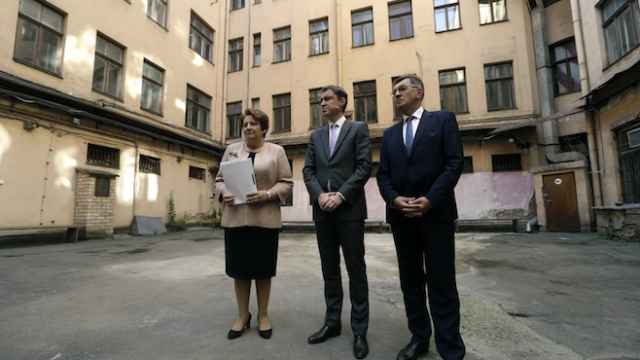RIGA — Latvians look likely to back their hawkish center-right ruling coalition in a parliamentary election on Saturday amid increased tensions with giant neighbor Russia, Riga's communist-era ruler, over the Ukraine crisis
Latvian Prime Minister Laimdota Straujuma has taken a tough stance towards Moscow over its policies in Ukraine, boosting defense spending and joining Baltic neighbors Estonia and Lithuania in pressing for a bigger NATO presence in their region.
Among her main opponents in the election is the traditionally pro-Moscow Concord party, which draws support from the ethnic Russians who make up about a quarter of Latvia's two million-strong population.
"I think that most likely we will have the same center-right coalition as we see now. And the main reason is Russia's aggression in Ukraine," said Andis Kudors, executive director of the Center for East European Policy Studies.
"Latvian parties will have a hard time convincing voters why they would go [into a coalition] with a Concord party which does not condemn Russia's aggression enough."
A survey conducted by polling company SKDS showed 32.5 percent would vote for the current coalition and 27.5 percent for the opposition, which includes Concord and a new leftist party called "For Latvia from the Heart."
Another 30.4 percent of respondents were undecided or did not plan to vote. Other polls have shown similar results.
Russia, which remains an important trade partner, has rattled Latvia by stepping up naval maneuvers and military flights near its sea and land borders.
The former Soviet republic is a member of both NATO and the European Union and has backed EU economic sanctions imposed against Moscow over its annexation of Ukraine's Crimea peninsula and its support for pro-Russian separatists in eastern Ukraine.
Austerity
Latvia, which now has one of the fastest growing economies in Europe, has been widely touted as an example of successful fiscal austerity policies.
After the 2008 financial crisis wiped out almost a quarter of its economy, Latvia slashed spending and wages and cut jobs to keep its lat currency pegged to the euro. It was rewarded for its efforts this year by joining the euro zone.
However, a backlash has emerged against high unemployment and years of economic austerity, prompting the ruling coalition to focus the election campaign on relations with the EU and Russia rather than on the economy.
"The absolute majority of Latvia's people, be they Latvians or Russian-speakers, are dissatisfied with the situation in the country," said Arnis Kaktins, director of polling and research company SKDS.
Straujuma took over as prime minister in January from Valdis Dombrovskis, who had been re-elected twice despite his painful economic austerity policies. Dombrovskis quit after taking political responsibility for the collapse of a supermarket roof in Riga that killed 54 people.
Concord has been among Latvia's most popular parties but has never won a place in government. Most of its voters are ethnic Russians, who make up almost 21 percent of the voters in Saturday's election.
Concord has pressed for Russian to become Latvia's second official language and recently voted against a parliamentary resolution supporting Ukraine against "Russian aggression."
Its leader, Nils Ushakovs, has stressed the importance of Latvia's economic ties with Russia.
"When we talk about our policy vis-a-vis Russia, I would definitely be more pragmatic," he said.
"We have to use the Russian market, we have to deal with Russian tourists. We have to try to benefit from being a neighbor with Russia that truly helps our economy."
A Message from The Moscow Times:
Dear readers,
We are facing unprecedented challenges. Russia's Prosecutor General's Office has designated The Moscow Times as an "undesirable" organization, criminalizing our work and putting our staff at risk of prosecution. This follows our earlier unjust labeling as a "foreign agent."
These actions are direct attempts to silence independent journalism in Russia. The authorities claim our work "discredits the decisions of the Russian leadership." We see things differently: we strive to provide accurate, unbiased reporting on Russia.
We, the journalists of The Moscow Times, refuse to be silenced. But to continue our work, we need your help.
Your support, no matter how small, makes a world of difference. If you can, please support us monthly starting from just $2. It's quick to set up, and every contribution makes a significant impact.
By supporting The Moscow Times, you're defending open, independent journalism in the face of repression. Thank you for standing with us.
Remind me later.





